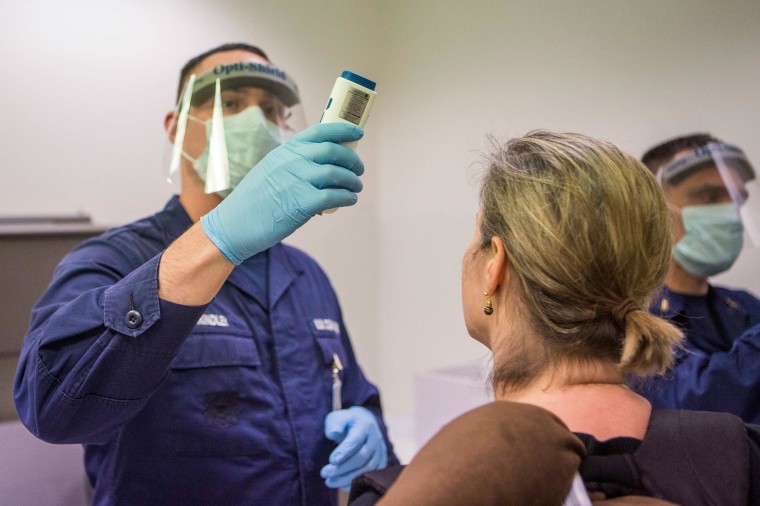Close to 50 volunteers have come back safe and well from the Ebola hot zone in West Africa, aid agencies tell NBC News, even as states debate whether to force such workers into quarantine.
A look at the numbers from groups such as Doctors Without Borders and the International Medical Corps shows just about 150 people have gone to help fight the epidemic in Liberia, Sierra Leone and Guinea. Of them, 47 have returned symptom-free.
President Barack Obama greeted many of the volunteers in the White House Wednesday, saying they should be applauded. “The world needs you more than ever,” he told them. “We (have) got hundreds of Americans from across the country...who are putting themselves on the front line of this fight,” he added. “When they come home, they deserve to be treated properly. They deserve to be treated like the heroes they are.”
To arrive at these numbers, NBC News polled 13 aid agencies, including the U.S. Public Health Service, Serving in Mission (SIM), Save the Children and the American Red Cross. They had among them sent 151 people to West Africa, and said 47 of them have come home symptom-free.
Among those who have been infected: SIM’s Nancy Writebol and Dr. Rick Sacra, Dr. Kent Brantly of Samaritan’s Purse, Dr. Craig Spencer of Doctors Without Borders and an as-yet unidentified worker with the World Health Organization. None has infected anyone else. Two nurses who treated Thomas Eric Duncan, a Liberian coming to settle in the United States, were infected and have recovered.
The case of Kaci Hickox, a nurse volunteering with Doctors Without Borders who was forcibly quarantined by first New Jersey and now Maine on her return from Sierra Leone, has polarized the United States. Governors like New Jersey’s Chris Christie have unapologetically said they’ll do what they must to protect their states’ citizens. But infectious disease experts including many who have treated actual Ebola patients disapprove of these measures, saying they go too far and will discourage volunteers just as they are most needed.
"You know I truly believe that this policy is not scientifically nor constitutionally just, so I am not going to sit around and be bullied by politicians and forced to stay in my home when I am not a risk to the American public," Hickox told NBC’s Kate Snow in an interview.
So health officials in Maine say they’ll seek a court order to make Hickox stay home, even though she has no symptoms of Ebola, might not ever get it, and is of no risk to anyone.
“We believe that there’s no basis, no justification, for such an order, but if the order is granted in the next day or two, we will fly up to Maine and we will challenge that order. Kaci told us if that happens we should go to court to obtain her freedom, and we will do that,” her attorney, Normal Siegel, said.
Other states are taking a milder approach. Texas sent its chief health officer, Dr. David Lakey, to greet a returning nurse on Wednesday. And Governor Rick Perry called the nurse, who wasn’t named.
“In Texas, we have a great tradition of welcoming our heroes back home and this heroic individual deserves our appreciation, our compassion, and our utmost respect,” Perry said in a statement. “The tremendous work that she and so many other health care workers are doing in West Africa is making life better for those in afflicted countries and helps protect the rest of the world from the spread of this terrible disease; they are doing vitally important work that makes us all proud.”
The nurse has agreed to self-quarantine and is being lavished with praise in return.
“This health care hero has made a great sacrifice in traveling abroad to minister to those who are suffering,” Perry said. “Even now home in Texas, she continues to demonstrate her selflessness by agreeing to quarantine herself and further protect her fellow Texans.”
The Centers for Disease Control and Prevention says even that’s not necessary. All anyone returning from West Africa needs to do is self-monitor. People who cared for patients without protection, or those who had unprotected contact with a patient, should stay home, but nurses who wore protected gear don’t fall into this category and should simply be closely watched, the CDC advises.
Some states, such as California, are following these guidelines.
“Not everyone who has been to an Ebola affected area should be considered high risk,” said California Department of Public Health director Dr. Ron Chapman.
But even the federal government is taking various approaches. The State Department said Wednesday it will not impose a blanket 21-day isolation period for State Department employees returning from Ebola-affected countries.
But Defense Secretary Chuck Hagel on Wednesday approved a recommendation that all U.S. troops returning from Ebola missions be kept in isolation. There are now 42 U.S. soldiers in quarantine at a complex in Vicenza, Italy. Another group is scheduled to arrive there on Friday, bringing the total number to 75.
